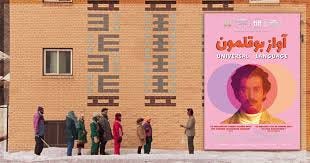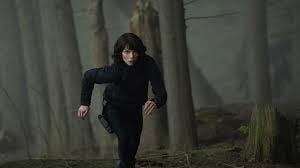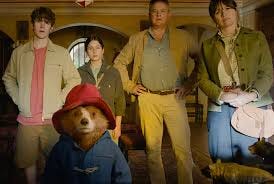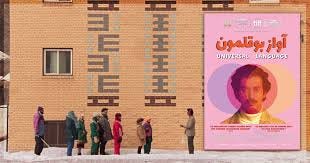As The Gorge opens, Levi (Miles Teller), an elite former Marine sniper now working as a private contractor, is hired by bigwig Bartholomew (Sigourney Weaver) for a mysterious new assignment—he is to be shipped off to a faraway undisclosed location to spend a year standing guard over a mysterious gorge for reasons that are never explained to him. When he arrives, he discovers that across the gorge from him is another tower containing another crack shot recruited by Eastern powers, Lithuanian assassin Drasa (Anya Taylor-Joy). The two hit it off but before long, they discover that there is indeed something monstrous lurking far below them that they are able to keep at bay with their weaponry. Before long, however, a series of mishaps lands the two of them deep inside the gorge itself and when they discover the truly horrifying secret behind what is going on, the two have to fight in order to both get out of gorge and to ensure that the dangers contained within are not allowed to escape.
Like so many movies being made specifically for streaming services (Apple in this case) these days, The Gorge is little more than a bland bit of hackwork that has inexplicably had a lot of money and talent thrown at it in the hopes of making it work. The film was directed by Scott Derrickson, whose work has swung between interesting projects like The Exorcism of Emily Rose and The Black Phone and misfires like The Day the Earth Stood Still, Sinister and Doctor Sleep, but he cannot find much of anything to do to help Zach Dean’s screenplay come across as anything more than something resembling a slightly elevated Uwe Boll production that contains nary an original moment or idea at any point in its two hour-plus running time. Although the two leads try their best to stand out amidst the faulty plotting and uninspired CGI effects, they never quite manage to bring life to their cliched characters and once the monster effect take over, they more or less check out for good. (It is especially depressing to see a performer as commanding and fascinating as Taylor-Joy stuck with the kind of material far beneath her talents.) Although perhaps not as awful as such cinematic Apple cores as Ghosted or Wolfs, The Gorge is just a bland bore from start to finish, the kind of meaningless and utter forgettable hackwork that does nothing except possibly reconsider your streaming options in the future
.It has been more than seven years since Paddington 2 arrived in theaters to charm audiences around the world and take its place as one of the great family films of recent times. At long last, the beloved children’s literature icon returns to the big screen with Paddington in Peru and while it doesn’t quite clear the high bar set by either its predecessor or the 2014 original, the results are still as charming, likable and endearing as its marmalade-loving central character. This time around, Paddington (once again voiced by Ben Whishaw) is still living with the Brown family—which is in the midst of low-key crisis due to mother Mary (Emily Mortimer, taking over for Sally Hawkins) fretting about the onset of empty nest syndrome as kids Judy (Madeleine Harris) and Jonathan (Samuel Joslin) prepare to leave home and father Henry (Hugh Bonneville) being tasked by his new superior at the insurance firm where he works to take more chances in life—when he gets word that his beloved Aunt Lucy (Imelda Staunton) has gone missing from the Home for Retired Bears where she lives under the supervision of a disquietingly perky and frequently singing nun (Olivia Colman). With the Browns along for the ride, Paddington, having proudly acquired his own passport, sets off for Peru and begins a journey into the jungle in the hopes of finding her. Aiding them, at least for a bit, is Hunter Cabot (Antonio Banderas), a riverboat captain who volunteers himself and daughter Gina (Carla Tous) to aid in their quest, though it soon turns out that he has a hidden agenda behind his seemingly noble efforts that I will leave for you to discover.
As I said, Paddington in Peru does not quite live up to its predecessors, though you could say that about 95% of the family films that have emerged in their wake. The only thing that drags it down a bit is its tendency to occasionally lean towards big action beats and the star turns from Banderas, Colman and a number of familiar faces in cameo roles than on the dynamic between Paddington and the Browns that were the true heart of the previous films. That said, the action beats are nicely done and blessedly lean more towards goofiness than intensity while Colman and (especially) Banderas bring a lot of high energy and goofball cheer to their turns so that they never wear out their welcomes. While these additions are fine, what continues to make these films work so well is the way that they manage to take the charm of the original books by Michael Bond and translate them into cinematic terms, retaining their quaint and decidedly British charms instead of making him into a broader and less distinctive character. The relationship between Paddington and his adoptive family continues to yield surprisingly emotional results and don’t be surprised to find a tear or two developing during the final scenes. At a time when the outside world is getting increasingly dark and bleak, Paddington in Peru is a film that suggests that there is still a place for kindness and decency in it as well as being both pro-immigration and solidly behind the belief that family consists of more than simple biological concerns. Who knows—maybe if those in charge these days had entertainments as warm and inclusive as this when they were in their formative years, perhaps we wouldn’t be in the mess that we currently find ourselves in
.At the end of last year, I submitted my list of the 10 best films of 2024 and in #5 slot, I included Matthew Rankin’s Universal Language, which I had seen at the Chicago International Film Festival and which provided me with the most laughs that I experienced in any film that year by far. Now it is beginning its commercial release in America and while my affection for the film has not diminished in the slightest—it even held up beautifully upon a second viewing—I now find myself in the odd position of explaining its peculiar charms to you in a way that will not have the effect of driving you away from it entirely. Although it doesn’t announce it explicitly, the film is set in a sort of alternate universe version of Canada where the culture of 80s-era Iran has inexplicably become dominant—there are still Tim Hortons, for example, but the signage on the outside is in Farsi. Instead of a straightforward plot, the film follows a number of locals as they go about their lives. In the brilliant opening scene, for example, a teacher (Mani Soleymanlou) in a school located near Winnipeg goes about his lesson—which appears to consist mostly of asking his students about their dreams and then immediately shooting them down—while demanding “Can’t you at least fool around in French?” Two of his pupils go out in search of a classmate’s missing glasses, which leads instead to the discovery of a banknote stuck in a frozen puddle that they are determined to retrieve. A character named Matthew Rankin (played by the filmmaker) returns home after a long absence and discovers how things are both different from and just the same as he remembers. Occasionally, we glimpse a tour guide taking visitors to such hilariously mundane locales as the site of the Parallel Parking Incident of 1958 and an apartment building where no one particularly famous ever lived.
Between the sheer strangeness of the concept and the relentlessly deadpan approach to the humor, my guess is that quite a few viewers may come away from Universal Language scratching their heads in complete confusion, if they even bothered to go to it in the first place. The film is absurd, of course, but it is absurdity done with a keen degree of precision that is reminiscent of filmmakers as varied as Abbas Kiarostami, Aki Kurasmaki and, perhaps most overtly, Guy Maddin while still coming across as fresh and original. In his debut feature, The Twentieth Century, Rankin offered up a loopy revisionist take on 20th century Canadian history that was also dazzling and hilarious in its sheer audacity. By comparison, this one is a little more restrained and nuanced in its approach and while that does not cut down on the laughs along the way (indeed, that opening classroom sequence is worth the price of admission all by itself), Rankin brings a little more warmth and humanity to the proceedings (in direct opposition to the frigid setting), not to mention intriguing ideas about cultural assimilation and the need to belong, so that it ultimately becomes more than just a series of weird jokes. I suspect that my attempt to explain my delighted reaction to Universal Language in ways that might make it seem appealing may not have been entirely successful but if what I have said has sparked any sort of interest, you should give it a chance if you can because you might find yourself as delighted with it as I.






